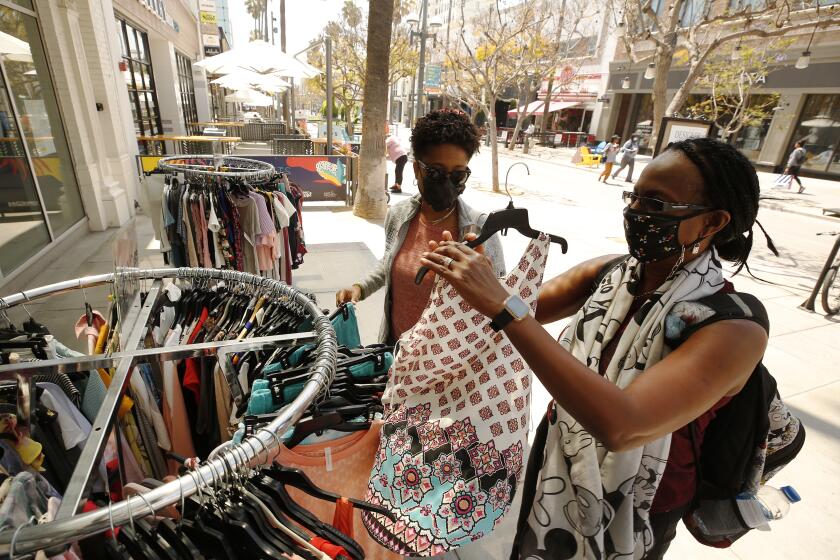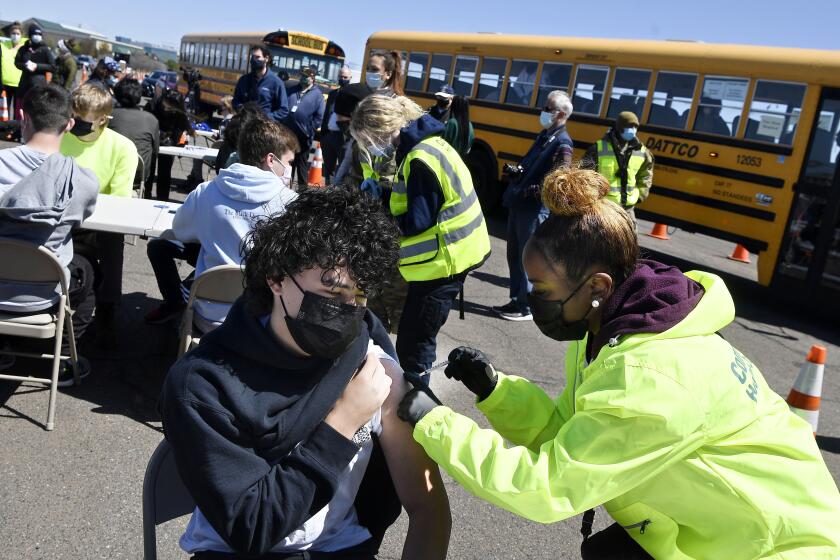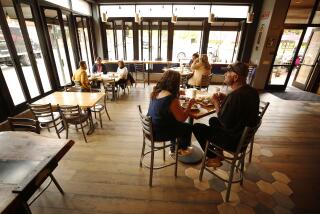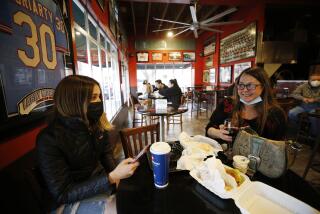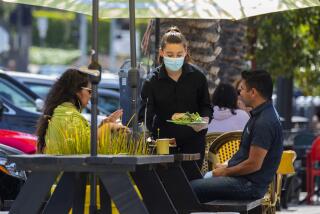L.A. County is now in the yellow tier. Here’s what the major reopening means to you
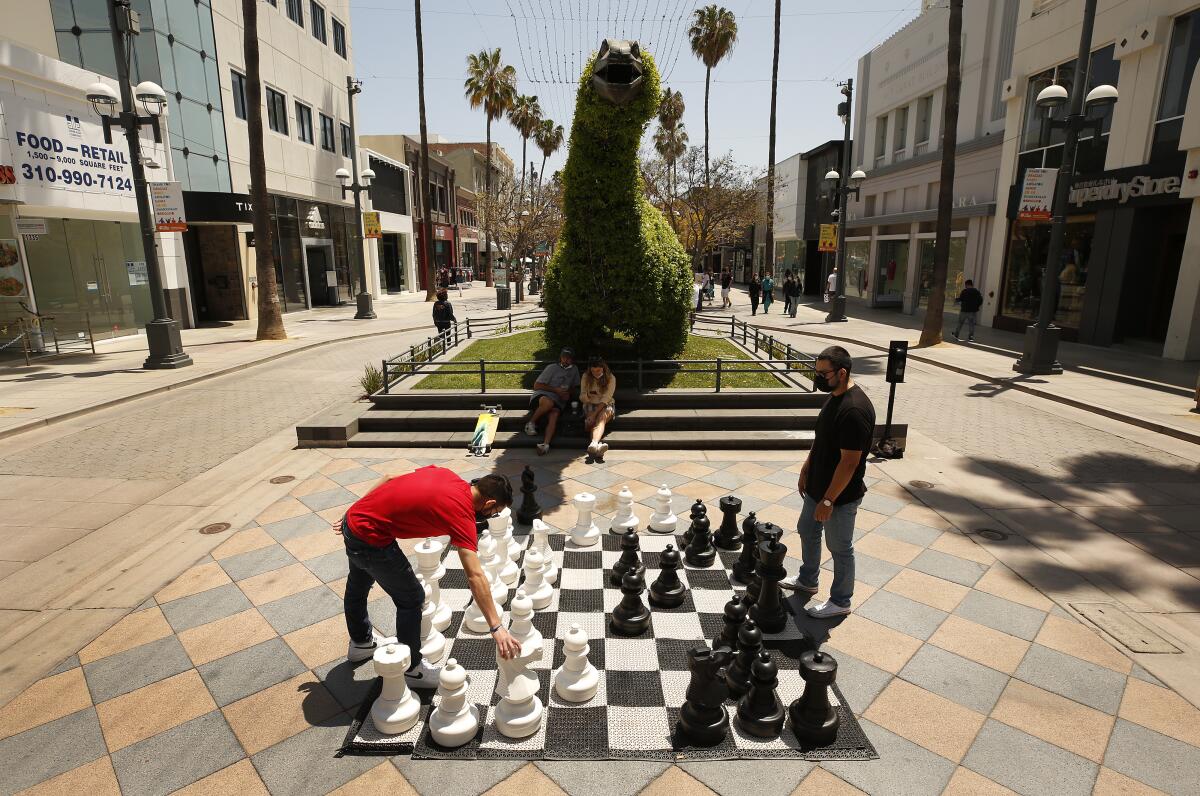
Thursday morning Los Angeles County entered the yellow tier of the state’s reopening blueprint, allowing for the broadest reopening of the economy since the pandemic began more than a year ago.
Here is what you need to know:
What does this change mean?
In general, reaching this level allows expanded capacity at restaurants, gyms, movie theaters, amusement parks, sports venues and museums. Bars can also reopen indoors without the requirement that they serve meals, and saunas and steam rooms can reopen.
The L.A. County Department of Public Health updated its public health order and released additional information on what’s allowed now. In some cases, the county’s rules are more specific or strict than state requirements.
L.A. County is the first county in Southern California to reach the yellow tier since the color-coded reopening system was established last summer.
L.A. hoping to supercharge economy by summer. But will tourists and office workers really return?
What can I now do?
For the most part, the yellow tier allows increased capacity at many retailers and attractions. One of the biggest change involves bars. Bars that don’t serve food can reopen indoors, with a maximum capacity of 25% or 100 people, whichever is fewer. Masks must be worn and can be removed only when seated at a table and eating or drinking. Customers cannot sit or be served at a counter.
Saunas and steam rooms can finally reopen at up to 50% capacity with physical distancing required. Gyms and fitness centers can expand indoor capacity to 50%, up from 25%. Masks are always required, except for swimming.
Water parks can reopen at 40% capacity with safety modifications.
Amusement parks and fairs can expand attendance to 35% of capacity, up from 25% in the orange tier. Visitors must either be California residents or fully vaccinated.
Restaurants are no longer capped at 200 guests at a time, as required in the orange tier, but still must operate at no more than 50% capacity indoors. The minimum distance required between tables has been reduced from eight feet to six feet.
Movie theaters can expand to up to 50% capacity, up from the previous cap of 25% or 100 people, whichever was fewer.
Indoor seated live events and performances in large-capacity venues — with seating for more than 1,500 guests — can reach 10% of capacity or 2,000 guests, whichever is fewer, but if everyone has a negative test or has proof of full vaccination, the limit can increase to 50%, up from 35% in the orange tier.
Here is a full list of the changes for the yellow tier.
Teams of experts also warn that a ‘substantial increase’ in hospitalizations and deaths is possible if unvaccinated people do not follow precautions.
How did we get here?
L.A. has made remarkable progress in fighting COVID-19 in recent months.
Moving to the yellow tier was hailed as a major achievement for L.A. County. It got there by recording an adjusted daily new case rate of fewer than 2 per 100,000 people, overall test positivity of less than 2% and a health-equity positivity rate of less than 2.2% for two consecutive weeks.
According to data released Tuesday, the county’s latest adjusted case rate was 1.6, one of the lowest rates in the state.
“We’ve done a really decent job holding our own if you look at our case numbers,” Public Health Director Barbara Ferrer said. “And people are really invested, I think, at this point in seeing our recovery move forward.”
Any warning signs ahead?
Officials are generally optimistic but have expressed concern at a recent 23% week-over-week drop in administered vaccine doses.
Only 47% of L.A. County residents have received at least one dose of a COVID-19 vaccine; health experts recommend an overall vaccination rate above 80%.
They also say physical distancing and wearing face coverings must continue and other safety rules must be followed if the county is to avoid regressing — which happened twice last year after other reopenings.
County Supervisor Hilda Solis called the greater reopening “exciting” but also urged people who aren’t yet fully vaccinated to be cautious. It takes two weeks after a final vaccine dose for a person to be considered fully vaccinated.
California is aiming to scrap the tier framework and fully reopen its economy June 15, as long as the supply of COVID-19 vaccine is stable and hospitalization numbers stay low.
More to Read
Sign up for Essential California
The most important California stories and recommendations in your inbox every morning.
You may occasionally receive promotional content from the Los Angeles Times.
